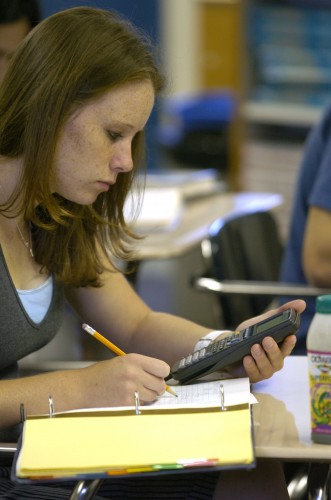 Many students in schools in the
United States a) perform poorly on mathematics assessments, b)
feel that their understanding of mathematics concepts is
inadequate, and c) dislike attending math class.
Many students in schools in the
United States a) perform poorly on mathematics assessments, b)
feel that their understanding of mathematics concepts is
inadequate, and c) dislike attending math class.
As mathematics education researchers we seek to address these
problems by engaging in design research to explore alternative
learning environments that make mathematics enticing and
empowering. We closely examine students’ thinking in these
environments to better understand how tools, collaboration and
communication support learning. We also work with teachers to
help them to re-envision mathematics instruction and begin to
teach in new ways. We are especially interested in enhancing
mathematics instruction in under-served communities.
The PhD in Mathematics Education focuses on reform in mathematics
curriculum, design and evaluation of effective mathematics
instruction, the process of learning mathematics, culture and
practice in the mathematics classroom, teachers’ perspectives and
development, and the impact of technology on the teaching of
mathematics.
Required Courses
32 units are required in mathematics and mathematics education.
In addition to the Ph.D. program core courses and methodology
requirements, mathematics education students are required to take
the following three core mathematics education courses:
- 255 – Curriculum Development and Evaluation in Mathematics
(4)
- 256A or 256B – Research in Mathematics Education (4)
- 294* – Special Topics in Science, Agriculture & Mathematics
Education (8 units)
Suggested additional courses to fill out the 32-unit emphasis
requirement include:
- 257 – Computer Technology in Mathematics Education (4)
- 294* – Special Topics in Science, Agriculture & Mathematics
Education (additional units)
- 210 – The Psychology of School Learning (4)
- 211* – Social & Situative Perspectives on Learning &
Cognition (4)
- 207 – Concepts of the Curriculum (4)
- 292 – Experiential Learning (4)
Up to 12 units of appropriate mathematics coursework may be
counted toward the 32-unit emphasis area requirement, and a
maximum of eight of these units in mathematics may be from
graduate work (e.g., the MA or MAT) completed prior to enrollment
in the PhD Program in Education. Transcripts should be submitted
to the emphasis area faculty for assessment. Students may choose
mathematics courses from upper division and graduate offerings in
consultation with their faculty advisor. Particularly encouraged
are courses in the field of mathematics most closely related to
the student’s research plans. Relevant upper division courses
include the following:
Mathematics Closest to Dissertation Research
- Arithmetic: Math 115A, 115B, 115C Geometry: Math 114, 116,
141
- Algebra: Math 108, 150A, 150B, 167 Probability: Math 131,
132A, 132B
- Calculus: Math 108, 127A, 127B Statistics: Statistics 108,
130A, 130B
Electives Students in the Mathematics Education emphasis are
expected to take a minimum of 6 units (2 courses) of additional
coursework in areas relevant to their research interests. These
courses, determined in consultation with the faculty advisor, are
intended to add breadth and/or depth to the student’s program of
study.
*Any course marked with an asterisk is a proposed course with a
tentative course number. Proposed courses are offered as sections
of EDU 292, Special Topics in Education, until they have
completed the approval process.